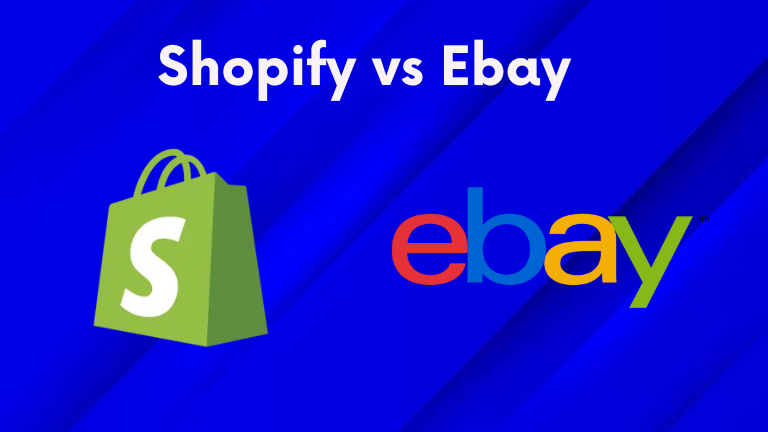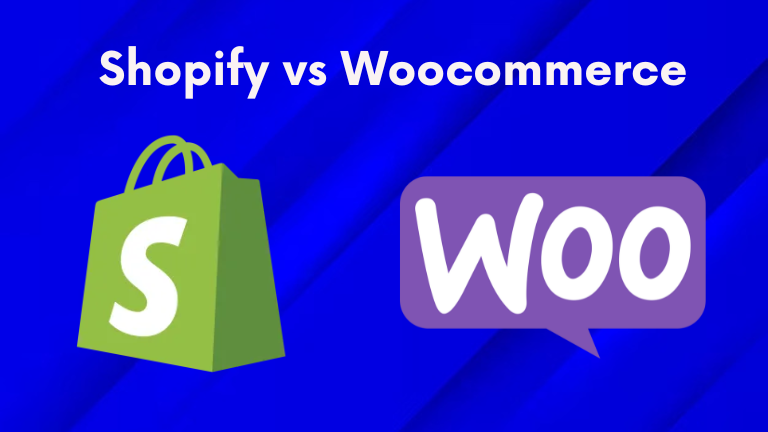
When setting up an online store, choosing the right e-commerce platform is crucial. Shopify vs WooCommerce are two of the most popular options available, each with its own strengths and weaknesses. In this comprehensive comparison, we’ll dive deep into their features, pricing, ease of use, and more to help you make an informed decision.
What is Shopify?

Shopify is a leading e-commerce platform that allows you to create an online store with ease. It is a hosted solution, meaning that Shopify takes care of all the technical aspects like security, hosting, and updates. This allows business owners to focus on selling their products rather than managing their website’s backend. Founded in 2006, Shopify has grown to become one of the most popular e-commerce platforms, supporting over a million businesses worldwide.
Key Features of Shopify
- User-Friendly Interface: Shopify’s interface is intuitive, making it easy for anyone to set up and manage their store. The drag-and-drop editor simplifies the design process, allowing you to customize your store without any coding knowledge.
- Hosted Platform: No need to worry about security, hosting, or technical updates. Shopify handles everything for you, ensuring your store is always up and running smoothly.
- Extensive App Store: Access to a wide range of apps and plugins to enhance store functionality. From marketing tools to inventory management, the Shopify App Store offers solutions for every aspect of your business.
- Mobile Optimization: All themes are optimized for mobile devices to ensure a seamless shopping experience for your customers, no matter what device they use.
- 24/7 Customer Support: Comprehensive support via email, live chat, and phone. Shopify’s support team is always ready to help with any issues you might encounter.
Pricing of Shopify
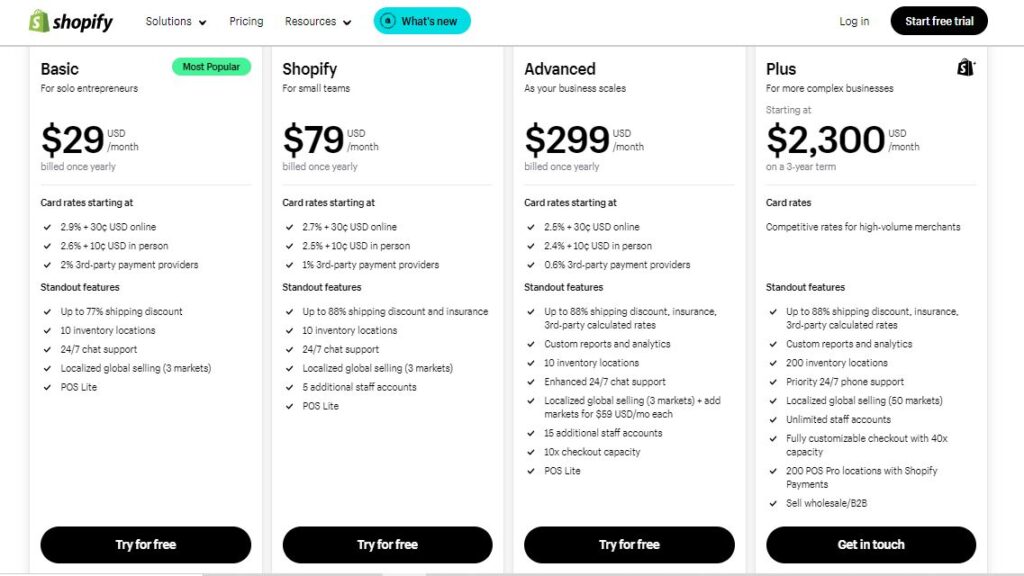
Shopify offers several pricing plans to cater to different business needs:
- Basic Plan: $24 per month, which includes essential features for starting a new business.
- Shopify Plan: $79 per month, offering additional features.
- Advanced Plan: $299 per month, providing advanced features.
- Plus Plan: $2,300 per month for B2B
Each plan includes security, hosting, and support, with the higher-tier plans offering more advanced features and reduced transaction fees. Additionally, Shopify offers a 3-day free trial then $1/month for your first 3 months if you click in the image below allowing you to explore the platform before committing to a plan.

What is WooCommerce?
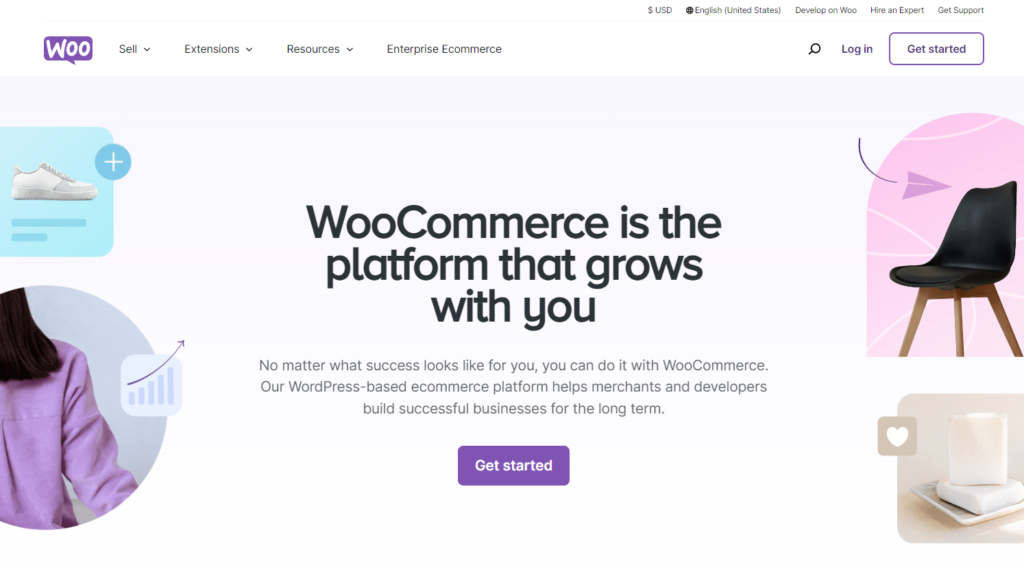
WooCommerce is an open-source e-commerce plugin for WordPress, allowing you to turn any WordPress website into a fully functional online store. It offers unparalleled customization options, giving you complete control over your store’s design and functionality. Launched in 2011, WooCommerce has quickly become the most popular e-commerce platform for WordPress, powering millions of online stores.
Key Features of WooCommerce
- Open-Source Platform: Complete control over customization and functionality. With WooCommerce, you have access to the source code, allowing you to make any changes you desire.
- Wide Range of Themes: Thousands of WordPress themes to choose from, both free and premium. Whether you want a simple design or a complex layout, you can find a theme that suits your needs.
- Flexibility: Extensive customization options to tailor your store to your exact needs. From custom product pages to unique checkout processes, WooCommerce can be adapted to fit any business model.
- Community Support: Active community forums, documentation, and tutorials. The WooCommerce community is vast and helpful, providing solutions to common issues and tips for enhancing your store.
- Integration with WordPress: Leverages the power of WordPress for content management and SEO. If you’re already familiar with WordPress, integrating WooCommerce will be seamless.
Pricing of WooCommerce
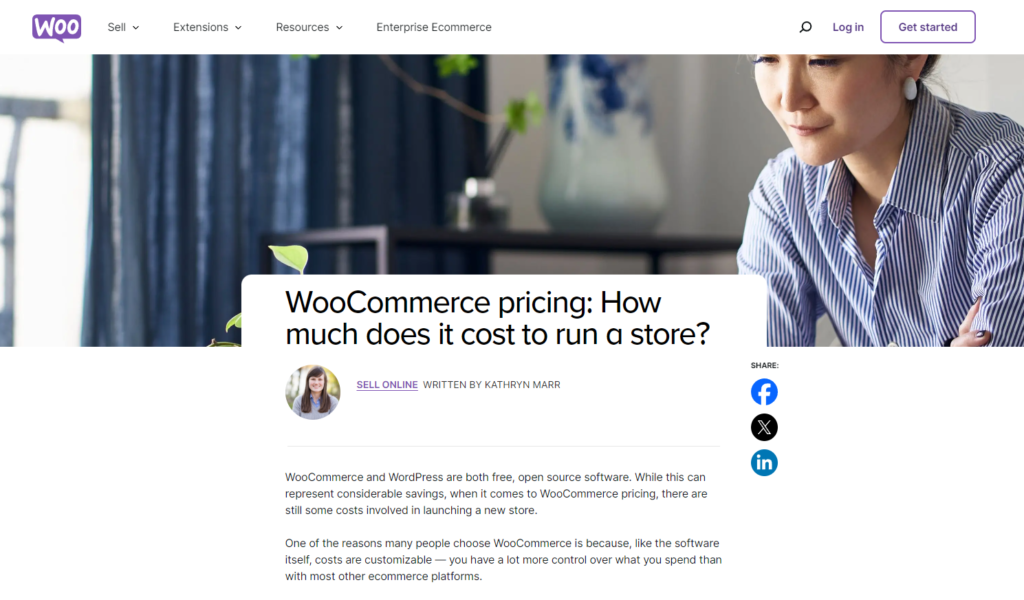
While WooCommerce itself is free, there are additional costs associated with running a WooCommerce store:
- Domain Registration: $10 per year.
- Hosting: $5 to $30 per month, depending on your hosting provider and plan.
- SSL Certificate: $0 to $100 per year, ensuring secure transactions for your customers.
- Premium Themes and Plugins: Varies widely, with some themes and plugins available for free and others costing hundreds of dollars.
The total cost depends on the services and features you choose to implement. Although WooCommerce can be cost-effective, managing these various expenses requires careful planning.
Shopify vs WooCommerce : Features Comparison
Shopify: Known for its user-friendly setup process, Shopify handles all the technical details, making it ideal for beginners. The setup wizard guides you through the initial steps, from selecting a theme to adding products.
WooCommerce: Requires more technical knowledge as you need to manage your own hosting, security, and updates. However, it offers more control and flexibility. Setting up WooCommerce involves installing the plugin on your WordPress site, configuring settings, and selecting compatible themes and plugins.
Customization and Design Flexibility
Shopify: Offers over 70 professional themes optimized for e-commerce. Customization is straightforward but somewhat limited compared to WooCommerce. The built-in theme editor allows you to make changes, but extensive customization might require coding knowledge or the help of a developer.
WooCommerce: Provides thousands of themes with extensive customization options. Ideal for those who want complete control over their store’s design. You can modify themes, add custom functionality, and use a variety of plugins to achieve the exact look and feel you want.
Sales and Marketing Tools
Shopify: Includes built-in tools for SEO, email marketing, and social media integration. The Shopify App Store offers additional marketing plugins, such as abandoned cart recovery, loyalty programs, and advanced analytics.
WooCommerce: Leverages WordPress’s robust SEO capabilities and offers a wide range of marketing plugins to enhance functionality. From SEO plugins like Yoast to email marketing tools like Mailchimp, WooCommerce provides powerful solutions for driving traffic and increasing sales.
Payment Processing and Fees
Shopify: Offers various payment options, including Shopify Payments powered by Stripe. Charges an additional 2% transaction fee for third-party payment gateways unless you’re on the advanced plan. Shopify Payments eliminates this fee, making it a cost-effective choice for many businesses.
WooCommerce: Supports numerous payment gateways like Stripe and PayPal without additional platform fees. Transaction fees depend on your payment gateway provider. You can also integrate local payment options to cater to international customers.
Customer Support and Resources
Shopify: Provides 24/7 customer support through email, live chat, and phone. Extensive documentation and community forums are also available. Shopify’s support team is known for being responsive and helpful, ensuring that any issues are resolved quickly.
WooCommerce: Support varies based on your hosting provider and the plugins you use. There is an active community with forums and documentation to help troubleshoot issues. Some premium themes and plugins also come with dedicated support.
Which One is Best for You?
Best Use Cases for WooCommerce
- Advanced Customization Needs: Ideal for those who need extensive control over their store’s design and functionality. If you require a highly customized solution, WooCommerce provides the flexibility you need.
- Existing WordPress Users: Perfect for those already familiar with WordPress. If you’re comfortable with the WordPress ecosystem, WooCommerce will integrate seamlessly into your workflow.
- Budget Flexibility: Can be more cost-effective if you can manage the technical aspects yourself. WooCommerce allows you to scale your expenses based on your needs and budget.
Best Use Cases for Shopify
- Ease of Use: Best for users who want a straightforward setup process without worrying about technical details. Shopify’s hosted solution handles everything for you, making it easy to get started.
- Comprehensive Support: Suitable for those who prefer having 24/7 support available. Shopify’s support team is always ready to assist with any issues.
- Scalability: Great for businesses of all sizes, especially those looking to scale quickly without technical constraints. Shopify’s infrastructure can handle high-volume sales and large inventories.
Final Considerations
When choosing between Shopify and WooCommerce, consider your technical skills, budget, and specific business needs. Shopify offers a more user-friendly, all-in-one solution, while WooCommerce provides greater flexibility and control. Each platform has its own strengths, and the best choice depends on your individual requirements and preferences.
Conclusion
- Shopify: User-friendly, hosted solution with extensive support and scalability options. Pricing starts at $19 per month, with higher-tier plans offering more features and reduced transaction fees.
- WooCommerce: Open-source plugin for WordPress offering complete customization and flexibility. Additional costs for domain, hosting, and SSL, but provides a high level of control over your store’s design and functionality.
Final Recommendation
For beginners or those who want a hassle-free setup, Shopify is the best choice. For those with technical skills who desire complete control over their store’s customization, WooCommerce is the way to go. Both platforms offer robust solutions for building a successful online store, so choose the one that aligns best with your business goals and capabilities.
If you’re leaning towards Shopify, take advantage of their free trial to explore its features and see if it’s the right fit for your business. Sign up through our link to get a discount of $1 per month for the first three months when subscribing to the basic plan.



